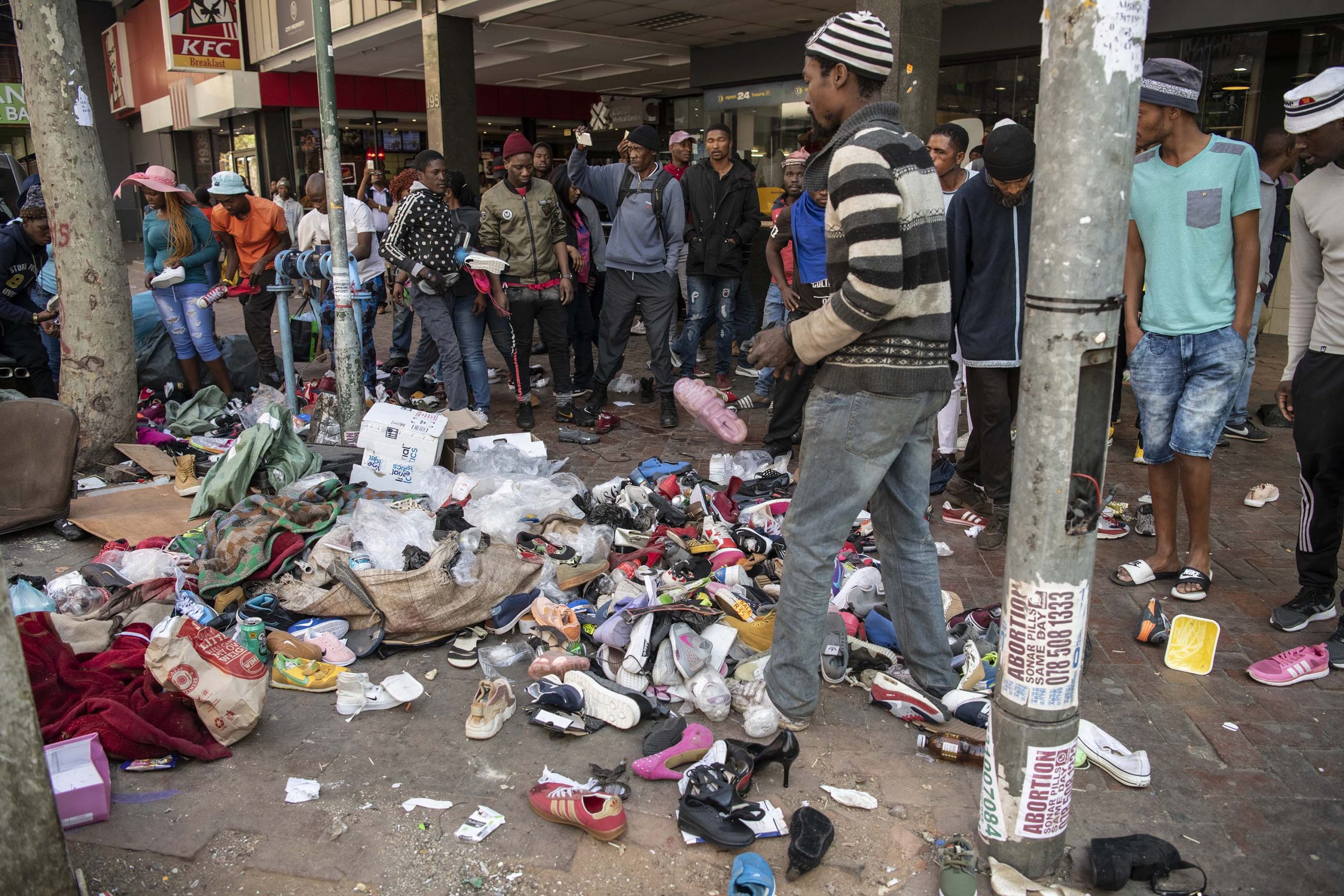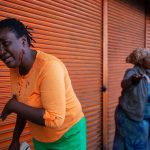Xenophobia heightens with calling of ‘mass shutdown’
Four government ministries claim South Africa is not xenophobic, seemingly ignoring the outbreak of violent xenophobic attacks around the country.
Author:
2 September 2019

Amid growing animosity towards migrants and threats of a nationwide shutdown in the trucking and other industries on 2 September 2019, a number of government ministries “convened an urgent meeting” on 1 September to report on the progress made in curbing the violence and figuring out a way forward.
The ministries of police, employment and labour, transport, and home affairs released a joint statement on Sunday evening. Their message was clear: “It is important to note that South Africa is not a xenophobic country.”
It is alarming that four government ministries have released a statement insisting that South Africa is not a xenophobic country at the same time that migrant-owned shops in Jeppestown in the Johannesburg CBD were looted. Migrant-owned shops in the Pretoria CBD were also looted last week following the murder of a taxi driver. The week also saw the release of a damning report by Human Rights Watch about ongoing attacks on migrant truck drivers.
The South African Road Freight Association (RFA) estimated that at least 213 people have been killed and 1 200 vehicles and cargo destroyed since March 2018. The RFA estimated that the losses totalled about R1.2 billion since “the war on trucks began”.
The “war” on the industry was started by the All Truck Drivers Foundation (ATDF) who demanded, among other things, the immediate firing of all “foreign nationals” employed by transport industries.
Related article:
The Human Rights Watch report called on the South African government to take urgent action to protect migrant drivers from “violence, intimidation and harassment in the country’s cycle of xenophobic violence”.
Dewa Mavhinga, Human Rights Watch’s Southern Africa director, says: “South African authorities should urgently intervene to stop the unlawful, unprovoked and violent attacks and harassment of foreign truck drivers and bring the perpetrators to justice.
The escalation of violence and threats in the freight industry brought the four ministries together urgently. One of many threats circulating on social media before the meeting warned of a planned shutdown by the Sisonke People’s Forum Hlanganani Makhosi Ohlanga of South Africa.

Warning pamphlet
It warned of a mass shutdown on 2 September calling on all “to come together as South Africans with one voice of enough is enough, on selling of drugs, on property theft, and on our work taken by foreign nationals.
“We as the people who fought for this freedom, find no respect from the owners of the companies and what is going to happen on the 2 September 2019 is to show our dissatisfaction, and to use our right to vote by taking out foreign nationals from our work,” the pamphlet warned.
“South Africa for South Africans. This is not xenophobia but the truth,” the message concluded.
Related article:
On 2 September, there was widespread daytime looting in Jeppestown. News24 reported that on 1 September three people died in a fire, following which a group of people from the Wolhuter Men’s Hostel in Jeppestown started looting shops.
The looting continued into the night of 1 September. African Diaspora Forum chairperson Vusumuzi Sibanda said it had spread to other parts of the city. The hostel has historically played an antagonistic role during xenophobic violence in South Africa, with mobs comprising hostel residents taking part in looting during some of the most violent incidents of xenophobia in 2008 and 2015.
The declarations denying that the widespread targeting of migrants is xenophobic are nothing new. Politicians and the South African government have historically gone out of their way to deny the existence of xenophobia, and have been doing so in recent months, despite the surge in grossly xenophobic language from all quarters of society.
Widespread xenophobia
Last week, after a taxi driver was murdered in the Pretoria CBD, taxi drivers and other opportunists targeted migrants in the area. Sheila Senkubuge, Tshwane Road and Transport MMC, defended the taxi drivers’ actions as an attempt to “protect their streets”.
“We don’t condone vigilantism. We are leaning on law enforcement to handle this situation, but I don’t believe that it’s a case of xenophobia or fighting against Nigerian nationals. It’s a genuine concern that the entire city has about in the increase of drug use and drug sales within the CBD,” she said.
Related article:
KwaZulu-Natal provincial police spokesperson Brigadier Jay Naicker said 20 people had been arrested in the province following violent protests in the trucking industry on the night of 1 September. He said 11 people were arrested for public violence and obstruction of traffic in Richards Bay, while another four were arrested for possession of an unlicensed firearm and ammunition. They were detained at the Malvern Police station. On the morning of 2 September, five more people were arrested in Estcourt on charges of attempted murder and malicious damage to property.
Danie Dunia, the secretary general of the Africa Solidarity Network, said migrants were attacked in Pietermaritzburg on Sunday night. Dunia said: “We are living in fear.”
Denialism and hypocrisy
New Frame previously reported on the widespread denialism of xenophobia by the political elite. Denying the existence of xenophobia in South Africa has not stopped opportunistic politicians from verbally attacking migrants in recent months. Government officials and politicians in both the ANC and the Democratic Alliance (DA) have normalised crude and grossly xenophobic statements.
Related article:
As unemployment, health, municipalities and crime worsen, the political elite will continue looking for vulnerable scapegoats to deflect the growing anger and discontent among South Africans. It has become clear in recent weeks that the political elite, and some ordinary South Africans, are happy to blame migrants for much of their misery.
Government’s failure or reluctance to acknowledge the existence of xenophobia in the country has not only enabled it to fester and spread, but it has allowed it to become such a widespread issue that it will be difficult to deal with. If government was able to acknowledge the severity of xenophobia in the country, it could potentially do something about it. Instead we’re stuck in a cycle where government officials and politicians across the spectrum make crudely xenophobic statements, condemn violence when it happens, and continue calling it any number of things except xenophobia.
‘Where is the leadership?’
Sibanda called on government to take more responsibility to put an end to normalised xenophobic comments and to prevent more violence.
“This is out of hand, it’s unacceptable, inhumane, beyond ice-age barbarism, at Jeppestown police [station] … allegedly a stone’s throw away but it took four lives for them to get to the scene,” he said on the night of 1 September. “What will it take for leadership to emerge and direct proper human behaviour? Is the country’s legal system so dysfunctional such that the country must descend into this chaos and … callously in cold blood killing other humans like ants?
“Where is the leadership of the country? When people disregard human life like this then it will not end with migrants, this murderous streak will be seen in violent crime outside migrants where people will murder each other as though that meant nothing,” he added.
Despite Sibanda’s pleas, and the police ministry’s promise that “law enforcement will ensure that the authority of the state is not undermined” fearmongers and criminals have been allowed to carry on with their xenophobic comments and violence against migrants.




